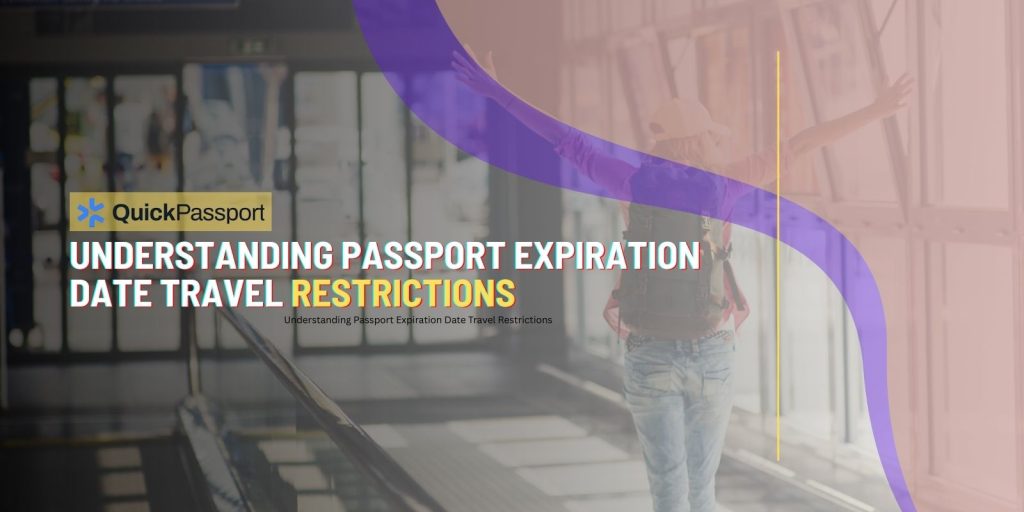Passport expiration dates create complex travel restrictions that catch millions of travelers off guard each year, leading to denied boarding, canceled trips, and significant financial losses. Understanding these restrictions goes far beyond simply checking that your passport hasn’t expired on the day you travel. Countries worldwide enforce varying validity requirements that can prohibit entry even when your passport appears valid for months after your planned return.
The intricacies of passport expiration rules involve multiple layers of requirements from destination countries, transit nations, airlines, and even travel insurance providers. These overlapping restrictions create a web of compliance requirements that vary dramatically depending on your citizenship, destination, travel purpose, and planned itinerary. What works for one destination may be completely inadequate for another, making comprehensive understanding essential for trouble-free international travel.
Modern international travel requires strategic passport management that accounts for these complex expiration requirements well in advance of any planned trips. The consequences of misunderstanding these rules extend beyond simple inconvenience, potentially resulting in thousands of dollars in lost reservations, emergency document fees, and disrupted travel plans that affect both business and personal commitments.
Overview
This comprehensive guide explains the complex landscape of passport expiration date travel restrictions that affect international travelers. You’ll learn about the widely misunderstood six-month validity rule and how it varies by destination, discover airline-specific policies that may be stricter than government requirements, and understand how transit countries add additional layers of complexity to expiration requirements.
We’ll explore how different types of travel—tourist, business, and transit—carry varying passport validity requirements, and examine real-world scenarios where travelers face unexpected restrictions despite apparently valid passports. The guide covers strategic renewal timing, emergency renewal options, and how professional passport services can prevent travel disruptions.
Additionally, you’ll understand how travel insurance, visa applications, and airline policies interact with passport expiration dates, creating additional considerations for comprehensive travel planning. Finally, we’ll show how QuickPassport Seattle helps travelers navigate these complex requirements with proactive renewal services and expert guidance.
Key Takeaways
• Many countries require six months of passport validity beyond your planned departure date, not just until your return • Airlines often enforce stricter policies than government requirements and may deny boarding even when government entry is technically possible • Transit countries may impose validity requirements even for brief layovers, affecting your entire itinerary • Visa applications typically require significant passport validity beyond the visa’s intended expiration date • Travel insurance may be void if passport expiration issues cause trip disruptions • Emergency passport renewal can take 1-2 weeks with professional services versus 6-8 weeks through standard government processing
The Six Month Passport Validity Rule Explained
The six-month passport validity rule represents one of the most misunderstood aspects of international travel, affecting travelers who assume their passport remains valid until its printed expiration date. This rule requires your passport to have at least six months of remaining validity from your planned departure date from the destination country, not your arrival date. The distinction proves critical because many travelers calculate from their arrival date and find themselves denied entry despite careful planning.

Countries implement this rule to ensure visitors can remain in the country for their permitted stay duration even if unexpected circumstances extend their visit. Immigration officials want assurance that travelers won’t become stranded with expired documents, creating diplomatic and logistical complications for both the visitor and the host country. The six-month buffer provides flexibility for medical emergencies, natural disasters, or other situations that might delay departure.
Not all countries enforce the six-month rule uniformly. Some nations require six months, others require three months, and a few only require validity through your planned departure date. European Union countries, for example, typically require three months of validity beyond your intended departure, while many Asian and South American countries enforce the full six-month requirement. Understanding your specific destination’s requirements prevents costly surprises at check-in or immigration.
The calculation method for passport validity creates additional confusion for travelers. When countries require six months of validity, they typically measure from your planned departure date from their country, not your arrival date. For a two-week vacation, this means your passport needs approximately six months and two weeks of remaining validity from the day you start your trip. This extended requirement often surprises travelers who focused only on their return date.
Country-Specific Passport Validity Requirements
Asian destinations frequently enforce strict six-month validity requirements that apply to most tourist and business travel. Countries including Thailand, Vietnam, Indonesia, Malaysia, and the Philippines require six months of remaining passport validity, and immigration officials strictly enforce these rules. China requires six months for most visa types, while Japan requires validity only through your planned departure date, creating important distinctions for multi-country Asian itineraries.
European travel operates under different standards due to the Schengen Agreement and European Union regulations. Most EU countries require three months of passport validity beyond your intended departure date, with some flexibility for emergency situations. However, Brexit has created new considerations for UK travel, and some European countries maintain their own specific requirements that supersede general EU guidelines.
Caribbean and Central American destinations show significant variation in their validity requirements. Popular destinations like Jamaica, Barbados, and Costa Rica require six months of validity, while others like the Bahamas and Bermuda only require validity through your stay. Mexico requires validity only through your planned departure, but many travelers use Mexico as a transit point to other destinations with stricter requirements.
South American countries typically enforce six-month validity requirements, with countries like Brazil, Argentina, and Peru strictly applying these rules to tourist visas and business travel. Some countries offer exceptions for certain visa types or diplomatic arrangements, but these exceptions rarely apply to typical tourist or business travel situations.
Airline Policies and Check-in Restrictions
Airlines implement their own passport validity policies that often exceed government requirements, creating an additional layer of restrictions that travelers must navigate. Most major carriers refuse boarding if your passport doesn’t meet the destination country’s requirements, but many airlines apply even stricter internal policies to avoid potential complications and liability. These airline policies aim to prevent situations where passengers are denied entry and must be returned at the airline’s expense.
Check-in systems automatically flag potential passport expiration issues based on destination requirements and airline policies. Gate agents and check-in staff typically lack authority to override these system warnings, even in situations where government entry might technically be possible. This automation means that arguing with airline staff about specific country requirements rarely succeeds, as they must follow company policies regardless of individual circumstances.
International airline alliances and partnerships create varying policy interpretations even within the same airport. Different airlines serving the same destination may apply different passport validity standards, leading to situations where one carrier accepts your passport while another refuses boarding. This variation makes it essential to understand your specific airline’s policies rather than relying on general destination requirements.
Transit and connecting flight situations add complexity to airline passport policies because carriers must ensure compliance with all countries in your itinerary. If your journey includes connections through countries with strict validity requirements, airlines may apply the most restrictive standard to your entire trip, even if your final destination has more lenient requirements.
Transit Country Considerations
Transit countries impose passport validity requirements even for travelers who never leave the airport during layovers, creating unexpected complications for multi-leg international journeys. Many travelers assume that staying within the international transit area exempts them from destination country requirements, but most nations apply their standard entry requirements to all passengers, regardless of transit intentions.

Popular transit hubs like Dubai, Istanbul, Amsterdam, and Frankfurt maintain their own passport validity requirements that affect all passengers passing through their airports. The United Arab Emirates requires six months of validity for all passengers, including those in transit, while Netherlands requires three months for transit passengers. These requirements apply even for brief layovers measured in hours rather than days.
Missed connections and flight delays can convert transit situations into temporary entries, requiring full compliance with the transit country’s immigration requirements. Airlines and airports cannot guarantee that mechanical issues, weather delays, or other disruptions won’t force you to officially enter the transit country for overnight stays or rebooking assistance. Immigration officials in these situations apply full entry requirements regardless of the circumstances that created the need for entry.
Some transit countries offer special transit visa arrangements or exemptions for certain passport holders, but these exceptions typically still require compliance with passport validity requirements. The complexity of these arrangements makes it essential to meet the most restrictive requirements for all countries in your itinerary rather than relying on potential exemptions that may not apply to your specific situation.
Visa Applications and Passport Expiration
Visa applications typically require significantly more passport validity than the visa’s intended duration or the standard entry requirements for the destination country. Most countries require your passport to remain valid for at least six to twelve months beyond the visa’s expiration date, ensuring that the passport won’t expire while the visa remains valid. This requirement applies even for short-term tourist visas and business visas intended for brief visits.
The visa application process creates timing challenges for travelers whose passports approach expiration during the application period. Visa processing times range from several days to several months, and passport renewal during an active visa application can complicate or invalidate the application entirely. Some countries require new visa applications if your passport is renewed after submission, while others allow passport updates with additional documentation and fees.
Business and work visas often require extended passport validity periods that exceed standard tourist requirements. Multi-year business visas or work permits may require passports valid for the entire visa duration plus additional months, creating situations where passport renewal becomes necessary even for passports with years of remaining validity. These requirements reflect the longer-term nature of business relationships and work commitments.
Student visas and academic exchange programs typically require passport validity through the entire academic program plus additional buffer time. Universities and educational institutions often specify passport validity requirements in their acceptance materials, and students may need to renew passports before beginning their programs even if significant validity remains.
Travel Insurance and Passport Expiration Issues
Travel insurance policies frequently exclude coverage for trip disruptions caused by passport expiration issues, treating these situations as preventable problems rather than covered emergencies. Insurance providers expect travelers to understand and comply with passport validity requirements, and policies typically void coverage when travelers fail to meet destination country entry requirements due to inadequate passport validity.
Claims related to denied boarding or entry due to passport expiration face routine denial under standard travel insurance policies. Insurance companies argue that passport validity requirements are publicly available information that travelers should verify before purchasing insurance and booking travel. This exclusion can result in significant financial losses when travelers face emergency rebooking, accommodation costs, or non-refundable reservation losses.
Some premium travel insurance policies offer limited coverage for passport-related issues, but these benefits typically apply only to unexpected passport loss or theft rather than expiration problems. Even policies that include passport coverage often require travelers to demonstrate that they checked validity requirements and believed their passport met all necessary standards.
Travel insurance purchased through airlines or travel agencies may include specific exclusions related to passport validity that differ from standalone policies. Reading policy terms carefully reveals these exclusions and helps travelers understand their actual coverage in passport-related situations, preventing false assumptions about protection against expiration issues.
Emergency Renewal and Last-Minute Solutions
Emergency passport renewal becomes necessary when travelers discover expiration issues close to their departure dates, requiring expedited processing that costs significantly more than standard renewal procedures. The U.S. State Department offers expedited service that reduces processing time to 2-3 weeks for an additional fee, but this timeline may still be inadequate for immediate travel needs.
Passport agencies in major cities provide limited appointment availability for life-or-death emergencies and travel within 72 hours. These appointments require proof of urgent travel needs such as medical emergencies, death in the family, or critical business situations. Appointment availability is extremely limited, and travelers often face weeks-long waiting periods even for emergency services.
Private passport expedition services offer the fastest and most reliable emergency renewal options for travelers facing passport expiration deadlines. Professional services like QuickPassport Seattle provide Priority Service with 1-2 week processing times through direct relationships with processing facilities and expedited handling throughout the application process. These services include document review, application preparation, and constant communication to ensure fastest possible processing.
Some emergency situations require temporary travel documents rather than full passport renewal. The State Department issues emergency passports for immediate travel needs, but these temporary documents have limited validity and may not be accepted for all destinations. Emergency passports work best for return travel to the United States rather than outbound international travel to countries with strict documentation requirements.
Strategic Passport Renewal Timing
Effective passport management requires planning renewal well in advance of expiration to accommodate various validity requirements and avoid emergency situations. Travel experts recommend renewing passports when they have 12-18 months of remaining validity, ensuring adequate time for visa applications, trip planning, and unexpected travel opportunities without expiration concerns.
Frequent travelers should maintain even more conservative renewal schedules due to the cumulative complexity of multiple trips with varying requirements. Business travelers, in particular, benefit from maintaining passports with maximum validity to accommodate last-minute travel opportunities, visa applications for multiple countries, and the extended validity requirements common in business visa applications.
Family travel coordination requires synchronized passport renewal schedules to prevent situations where some family members can travel while others cannot. Parents should track all family member passport expiration dates and plan coordinated renewal to ensure family travel remains possible. Children’s passports expire more frequently due to their five-year validity period, requiring more frequent attention than adult passports.
Planning major life events like marriages, relocations, or career changes should include passport renewal considerations. Name changes due to marriage, address changes for tax purposes, and international job opportunities all interact with passport validity requirements. Addressing passport renewal before these major changes prevents complications and ensures travel flexibility during transition periods.
How QuickPassport Seattle Prevents Travel Disruptions
QuickPassport Seattle specializes in preventing passport expiration travel disruptions through proactive renewal services and expert guidance on validity requirements. Their team understands the complex landscape of international passport requirements and helps travelers plan renewal timing that accommodates their specific travel patterns and destination preferences. This expertise prevents emergency situations and ensures optimal travel flexibility.
Comprehensive validity requirement consultation helps travelers understand their specific needs based on planned destinations, travel frequency, and visa requirements. QuickPassport Seattle maintains current information about country-specific requirements and airline policies, providing personalized guidance that accounts for individual travel patterns and preferences. This consultation prevents surprises and ensures adequate passport validity for all planned travel.
The three-tier service structure accommodates different renewal timelines and urgency levels: Smart Service (4-6 weeks) for advance planners, Expedited Service (2-4 weeks) for moderate urgency, and Priority Service (1-2 weeks) for urgent situations. Each service level includes document review, application preparation, and professional handling to ensure successful renewal without delays or complications.
Ongoing support throughout the renewal process includes status updates, processing timeline management, and immediate assistance if complications arise. QuickPassport Seattle monitors applications and communicates directly with processing facilities when necessary to ensure renewals proceed smoothly and meet promised delivery timelines.
Common Questions About Passport Expiration Date Travel Restrictions
What is the six-month passport rule and which countries enforce it? The six-month rule requires your passport to have at least six months of remaining validity from your planned departure date from the destination country. Countries including Thailand, Vietnam, Indonesia, Malaysia, Philippines, and most South American nations enforce this rule. European Union countries typically require three months, while some destinations only require validity through your stay.

Can airlines deny boarding even if my passport meets government requirements? Yes, airlines often implement stricter policies than government requirements and may deny boarding to avoid potential liability. Airline check-in systems automatically flag potential expiration issues, and gate agents typically cannot override these warnings. Airlines must ensure compliance with all countries in your itinerary, sometimes applying the most restrictive standard to your entire trip.
Do passport expiration rules apply to transit passengers who don’t leave the airport? Most countries apply their standard passport validity requirements to all passengers, including those in transit. Popular hubs like Dubai, Istanbul, and Amsterdam maintain these requirements even for brief layovers. Flight delays or missed connections can force transit passengers to officially enter the country, requiring full compliance with entry requirements.
How far in advance should I renew my passport before it expires? Travel experts recommend renewing when you have 12-18 months of remaining validity. This timeline accommodates six-month validity requirements, visa application processing, and unexpected travel opportunities. Frequent travelers should maintain even more conservative schedules due to varying requirements across multiple destinations.
What happens if I discover my passport expires too soon for my planned trip? You’ll need expedited renewal services to meet your travel deadline. Government expedited service takes 2-3 weeks, while private services like QuickPassport Seattle offer Priority Service with 1-2 week processing. Emergency passport services are available for travel within 72 hours but require proof of urgent travel needs and have limited appointment availability.
Does travel insurance cover trip disruptions caused by passport expiration issues? Most travel insurance policies exclude coverage for passport expiration problems, treating them as preventable issues rather than covered emergencies. Insurance companies expect travelers to verify requirements before purchasing coverage. Some premium policies offer limited passport-related benefits, but these typically apply to loss or theft rather than expiration.
How do visa applications affect passport expiration requirements? Visa applications typically require six to twelve months of passport validity beyond the visa’s expiration date. Processing times can complicate renewal timing, and some countries require new applications if passports are renewed during processing. Business and student visas often require extended validity periods that exceed standard tourist requirements.
Can I travel if my passport expires during my trip but after my planned return? This depends on your destination’s specific requirements. Countries with six-month rules require validity six months beyond your departure date, making travel impossible even if your passport covers your planned stay. Some destinations only require validity through your stay, but airlines may still deny boarding based on their policies.
What should I do if I’m already at the airport and discover passport expiration issues? Unfortunately, options are very limited once you reach the airport. Airlines cannot override their boarding policies, and emergency passport services require advance appointments. You may need to cancel your trip and pursue emergency renewal for future travel. This situation emphasizes the importance of checking requirements well in advance.
How do connecting flights affect passport expiration requirements? Transit countries impose their own validity requirements even for brief layovers, and airlines must ensure compliance with all countries in your itinerary. Your passport must meet the most restrictive requirement among all destinations, including transit stops. Missed connections can force temporary entry into transit countries, requiring full compliance with their immigration requirements.
Protecting Your Travel Investment Through Proper Passport Management
Understanding passport expiration date travel restrictions requires recognizing that these rules extend far beyond simple expiration dates to encompass complex requirements that vary by destination, airline, and travel circumstances. The six-month validity rule affects more destinations than many travelers realize, and airlines often apply even stricter policies to avoid liability and complications. Transit countries add additional layers of requirements that affect your entire itinerary regardless of your final destination.
Proactive passport management prevents costly travel disruptions and ensures maximum flexibility for both planned and spontaneous travel opportunities. Renewing your passport with 12-18 months of remaining validity accommodates most international requirements while providing adequate time for visa applications and travel planning. This conservative approach eliminates emergency renewal situations and associated stress.
The financial consequences of passport expiration issues extend beyond simple inconvenience to include lost reservations, emergency document fees, and travel insurance exclusions that can cost thousands of dollars. Understanding these risks and planning accordingly protects your travel investment while ensuring compliance with complex international requirements.
QuickPassport Seattle offers comprehensive passport renewal services designed to prevent travel disruptions through expert guidance, reliable processing timelines, and professional document handling. Their understanding of international requirements and airline policies helps travelers maintain optimal passport validity for unrestricted travel flexibility. Contact QuickPassport Seattle today to discuss your renewal timeline and ensure your passport provides the validity needed for worry-free international travel.






